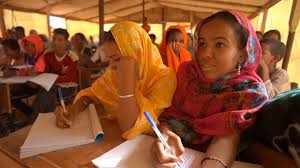Mauritania is the second host country for refugees fleeing Mali. Almost 55,000 people of the 135,000 who have fled Mali are now in Mauritania. Nearly 60% of those are children. As the conflict in Northern and Central Mali worsens, Aid Zone travelled to the Mbera refugee camp in Mauritania to see what is being done to educate the refugee minors there and protect them from forced marriage and child labour.
Seen from above, Mbera is a sea of tents and sand. 55,000 refugees have travelled the 60 kilometres from the border to get there. It is the only such camp for Malians in Mauritania.
Overcoming trauma
The flow of new arrivals into Mbera is constant. Two thirds of those in the camp children, meaning, after food and healthcare, education is vital.
«I’m happy because education means a lot to me. It lets me see the world differently,» explains Sadio, a Malian refugee.
Being able to attend class is crucial for students like Sadio. Otherwise girls in the camp face the prospect of being forced into marriage, while boys risk being sent off to work. On top of such dangers, many of these children have experienced considerable trauma before arriving in Mauritania.
«I was forced to marry when I was 15 years old. The marriage failed due to the fact that I had a very difficult pregnancy. After I survived that, my parents suggested I should leave for Mauritania,» Sadio says.
Now 17-years-old, Sadio is the mother of a two-year-old girl. She is at school thanks to the efforts of Rougui, a social worker with a local NGO financed by UNICEF. The project is funded by EU Humanitarian Aid.
Rougui Deme, a Social Work Assistant at the camp, said: «I asked: ‘Did you go to school?’ She told me: ‘Yes I went before’. I asked: ‘Are you married?’ She said: ‘I’m divorced’. I asked: ‘Do you want to go back to school?’ She said : ‘Yes’. I thought that a child who has a child is also a vulnerable child herself.»
5000 students in the camp are in school
Out of a total of 31,000 children in the camp, around 20,000 are of school age. There are eight primary schools for them. Such a large number of children is obviously a challenge for UNICEF and the UNHCR due to a lack of classrooms and teachers. In spite of that, over 5,000 students are receiving education.
«My parents didn’t go to school, so I will be the one who studies in order to achieve something,” one girl says.
Cheikou Wane, a Child Protection Officer working for Unicef at Mbera says: «Some children arrived in 2012. They were traumatised by what they had seen in Northern Mali. We help to re-integrate the children into school or, if they are older than school age, we place them in literacy or training centres.»
«Over 4,600 students were enrolled in primary school in the first few months of this school year. The numbers are lower in secondary school, with just over 300 enrolled. The challenge here at Mbera is to keep children in the classroom until secondary school. Last year around 50 students graduated.”
As part of efforts to educate the children in Mbera, the EU is helping to finance the building of new schools in the camp. According to EU Humanitarian Aid, providing education in emergencies is one of the best ways to invest in childrens’ long-term future.
«Education is one of the most underfunded sectors of humanitarian aid. First comes food, shelter, health, water; and education only gets 3 percent of global funding. So this is why the EU has decided to support this sector. And we have managed to increase from one to 10 percent of our humanitarian budget the share of funding that we dedicate to education,» says Isabel Coello from EU Humanitarian Aid.
Source of the review: https://www.euronews.com/2019/02/21/malian-refugees-in-mauritania-education-in-an-emergency-context







 Users Today : 17
Users Today : 17 Total Users : 35460370
Total Users : 35460370 Views Today : 24
Views Today : 24 Total views : 3419124
Total views : 3419124